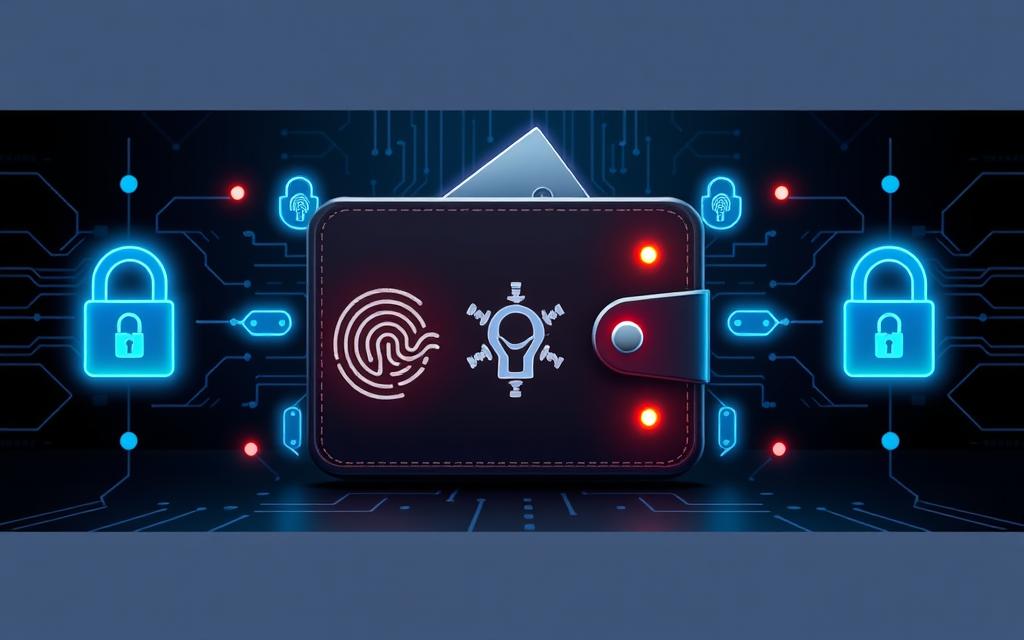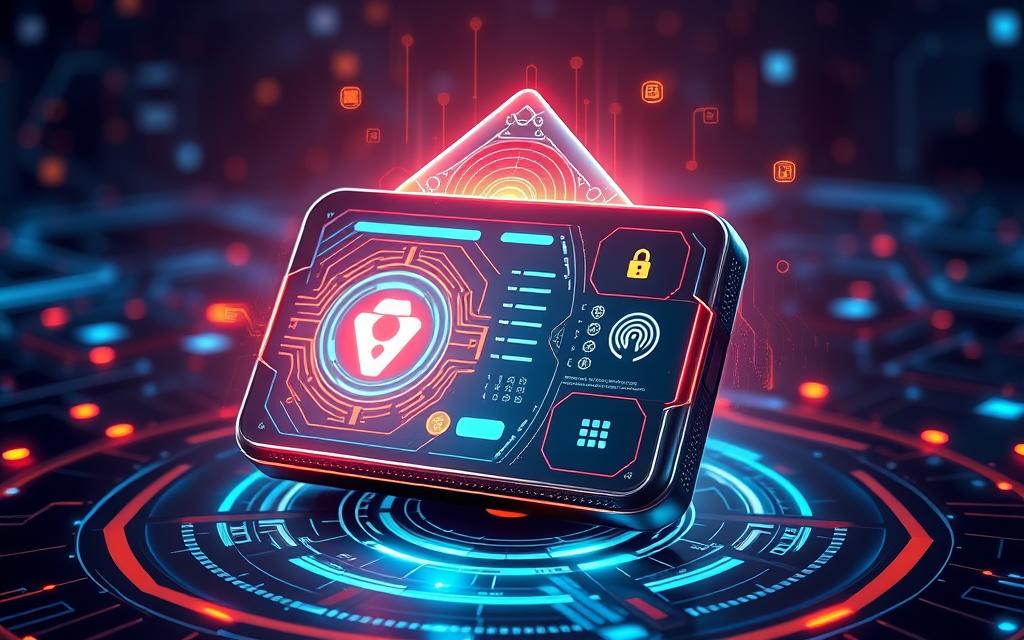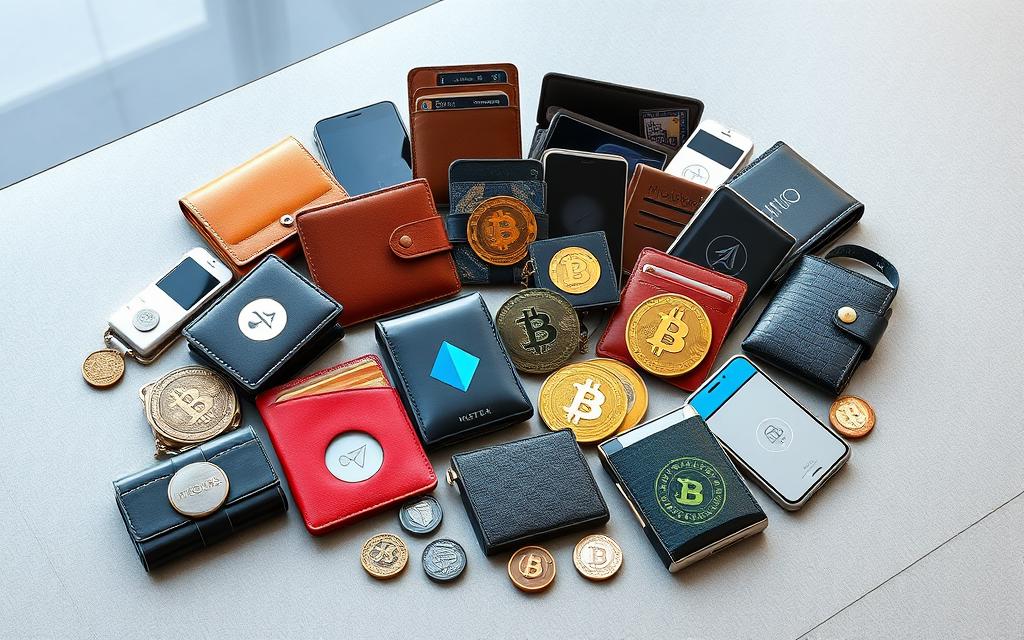There are over 10,000 cryptocurrencies out there, and Trust Wallet supports more than 10 million digital assets. This makes finding a secure wallet more important than ever. We’re here to help you find the best crypto wallet for your digital assets.
Choosing a crypto wallet is crucial for keeping your digital assets safe. With many options, including hardware and software wallets, picking the right one can be tough. Our guide aims to simplify your search, helping you find the perfect wallet for your needs.
Understanding Crypto Wallets: Your Digital Asset Storage Solution
In today’s digital age, the world of finance is constantly evolving. One of the most revolutionary developments in recent years has been the rise of cryptocurrency. As more and more people begin to invest in and trade these digital assets, the need for secure storage solutions has become increasingly important.
Enter the crypto wallet. A crypto wallet is a digital tool that allows individuals to securely store and manage their cryptocurrency assets. Much like a traditional wallet, a crypto wallet allows users to send and receive digital currency, as well as monitor their balances and transaction history..
A multi-currency wallet lets you keep different cryptocurrencies in one spot. It’s great for both new and seasoned investors. Having a digital wallet for cryptocurrencies is essential.
There are two main types of crypto wallets: hot and cold. Hot wallets are always online, making transactions easy but riskier. Cold wallets keep your private keys offline, offering better security.
1. Hot Wallets: Always Connected to the Internet
Hot wallets are convenient for frequent trading and transactions. However, they are more vulnerable to hacking due to their internet connectivity.
- Examples:
- Mobile Wallets (e.g., Trust Wallet)
- Desktop Wallets (e.g., Exodus)
- Web Wallets (e.g., MetaMask)
- Pros:
- Easy to use
- Ideal for active traders
- Cons:
- Higher risk of cyberattacks
2. Cold Wallets: Offline Storage
Cold wallets store your private keys offline, offering a higher level of security for long-term storage.
- Examples:
- Hardware Wallets (e.g., Ledger, Trezor)
- Paper Wallets (printed QR codes for private and public keys)
- Pros:
- Highly secure
- Immune to online threats
- Cons:
- Less convenient for frequent transactions
- Risk of physical damage or loss
Choosing the right crypto wallet depends on your needs. If you want to keep your coins safe for a long time, a cold wallet is best. For quick transactions, a hot wallet might be better.
Popular crypto wallet options include software, hardware, and paper wallets. Each has its own benefits and drawbacks. The best one for you depends on your specific needs.
Types of Crypto Wallets Available Today
Exploring cryptocurrency, you’ll find many types of crypto wallets. Each has its own benefits. You can pick a hardware crypto wallet for top security or a crypto wallet app for ease of use.
These are the different types of crypto wallets available today:
1. Hardware Wallets:
Hardware wallets are physical devices that store your cryptocurrency offline, making them incredibly secure. They are resistant to hacking and malware attacks since they are not connected to the internet. Hardware wallets come in various shapes and sizes, from USB sticks to small devices resembling traditional USB drives. Some popular hardware wallet brands include Ledger and Trezor.
2. Software Wallets:
Software wallets are digital wallets that can be accessed online or through a mobile application. They are convenient and easy to use, making them a popular choice for beginners. Software wallets can be further divided into desktop wallets, mobile wallets, and web wallets. Desktop wallets are installed on your computer, mobile wallets on your smartphone, and web wallets are accessed through a web browser. Some well-known software wallet providers include Exodus, Electrum, and MyEtherWallet.
3. Paper Wallets:
Paper wallets are a form of cold storage where a physical piece of paper contains your public and private keys. They are considered one of the most secure ways to store cryptocurrencies since they are not connected to the internet. Paper wallets are typically created by generating a pair of keys offline and printing them out. While paper wallets are secure, they can be easily lost or damaged, so it’s crucial to store them in a safe place.
4. Multi-Signature Wallets:
Multi-signature wallets require more than one private key to authorize a transaction. This added layer of security makes them ideal for businesses or individuals looking to share control over their funds. With multi-signature wallets, a predetermined number of keys are needed to send funds, reducing the risk of theft or fraud.
5. Custodial Wallets:
Custodial wallets are managed by a third party, such as a cryptocurrency exchange or wallet provider. While they are convenient and easy to use, custodial wallets come with a higher risk since users do not have full control over their private keys. It’s essential to choose a reputable custodial wallet provider to ensure the security of your funds.
There are various crypto wallet options available today, each with its own strengths and weaknesses. Whether you prefer the security of a hardware wallet, the convenience of a software wallet, or the added security of a multi-signature wallet, it’s crucial to choose a wallet that meets your specific needs and preferences. Remember to do thorough research and take necessary precautions to keep your cryptocurrencies safe and secure.
When picking a crypto wallet, think about what you need. If security is key, go for a hardware crypto wallet. For something easy to use, a crypto wallet app might be better.

The right crypto wallet for you depends on your needs and how much risk you’re willing to take. Knowing about the different wallets helps you choose wisely. This ensures your crypto transactions are both secure and convenient.
Hardware vs Software Wallets: Making the Right Choice
When it comes to storing your cryptocurrency, you have two main options: hardware and software wallets. As a beginner, choosing the best crypto wallet for your needs can be overwhelming. A hardware crypto wallet is a popular choice for its enhanced security features, but software wallets have their own advantages.
A key benefit of hardware wallets is that they store your private keys offline, reducing the risk of online hacks. In contrast, software wallets are always connected to the internet, making them more vulnerable to malware and phishing attacks. However, software wallets are generally more user-friendly and accessible on various devices.

Some of the benefits of hardware wallets include their ability to keep private keys offline, reducing the risk of online attacks. They are also often designed with robust security measures, such as secure element chips and PIN lock functionality. On the other hand, software wallets are favored for their ease of use and quick access to cryptocurrency.
Ultimately, the choice between a hardware and software wallet depends on your specific needs and preferences. If security is your top priority, a hardware crypto wallet may be the best choice. But if you prioritize ease of use and quick access, a software wallet could be the way to go. By considering your options and choosing the best crypto wallet for beginners, you can ensure the safe and secure storage of your cryptocurrency.
Essential Security Features in Modern Crypto Wallets
Storing your digital assets safely is key. A secure cryptocurrency wallet is essential. With the growth of cryptocurrency, security in crypto wallets is more important than ever. A top crypto wallet must have features like two-factor authentication, encryption, and backup options.
Some important security features to look for include:
- Two-factor authentication to reduce risks
- Encryption to safeguard your private keys
- Backup options, like a twelve-word mnemonic seed phrase, for asset recovery
A secure cryptocurrency wallet also needs a strong password and regular updates. Using a hardware wallet, like Ledger or Trezor, offers much greater security than software wallets.

In summary, a top crypto wallet must combine various security features. Choosing a wallet with these features ensures your cryptocurrency is safe. It also protects you from potential threats.
Popular Multi-Currency Wallets for Diverse Portfolios
Exploring cryptocurrencies, you’ll find many wallets to store your digital assets. A multi-currency wallet is great for those with many cryptocurrencies. It lets you manage them all in one spot. Think about what you need when picking a digital wallet.
A multi-currency wallet is perfect for managing different cryptocurrencies. Trust Wallet, Exodus, and Coinbase Wallet are popular choices. Trust Wallet supports over 100 blockchains and altcoins. Exodus supports over 260 cryptocurrencies.

When picking a wallet, look at security, ease of use, and device compatibility. Check if it supports cryptocurrencies like Bitcoin, Ethereum, and Litecoin. Some wallets also let you trade between different cryptocurrencies easily.
Top Desktop Solutions
Desktop wallets like Exodus and Electrum are secure and work on Windows, Linux, and macOS.
Mobile Wallet Options
Mobile wallets, such as Trust Wallet and Coinomi, are easy to use on the go. They often have QR code scanners and built-in exchanges.
Web-Based Alternatives
Web-based wallets, like Coinbase Wallet and B2BinPay, are easy to use from any device. But, they might be riskier because they’re online.
Here are some of the most popular multi-currency wallets on the market today:
1. Exodus Wallet: Exodus is a user-friendly multi-currency wallet that supports over 100 different cryptocurrencies. It features a sleek and intuitive interface that makes it easy to manage your portfolio and track your assets. Exodus also offers built-in exchange functionality, allowing you to easily swap between different cryptocurrencies without having to use an external exchange.
2. Trust Wallet: Trust Wallet is a decentralized multi-currency wallet that supports a wide range of cryptocurrencies, including ERC-20 tokens and Binance Coin. It offers a high level of security, with private keys stored locally on your device and encryption to protect your funds. Trust Wallet also integrates with the Binance DEX, making it easy to trade directly from your wallet.
3. Coinomi Wallet: Coinomi is a popular multi-currency wallet that supports over 1,500 different cryptocurrencies. It offers strong security features, including automatic encryption and backup, as well as support for multiple languages. Coinomi also features built-in exchange functionality, allowing you to trade between different cryptocurrencies directly within the app.
4. Atomic Wallet: Atomic Wallet is a multi-currency wallet that supports over 300 different cryptocurrencies. It offers a clean and intuitive interface, as well as strong security features like built-in encryption and a decentralized trading platform. Atomic Wallet also allows for the purchase of cryptocurrencies with fiat currency through third-party partners.
5. Ledger Nano S: While not a software wallet, the Ledger Nano S is a popular hardware wallet that supports a wide range of cryptocurrencies. It offers a high level of security, with private keys stored offline on the device and a secure chip to protect against malware. The Ledger Nano S is a great option for those looking for maximum security for their diverse cryptocurrency portfolio.
A multi-currency wallet is an essential tool for managing a diverse portfolio of cryptocurrencies. Whether you prefer a software wallet like Exodus or Trust Wallet, or a hardware wallet like the Ledger Nano S, there are plenty of options available to suit your needs. By choosing a reliable and secure wallet, you can rest assured that your investments are safe and easily accessible whenever you need them.
Getting Started with Your First Crypto Wallet
Starting your journey with cryptocurrency means picking the right wallet. A good crypto wallet app makes managing digital assets easy. First, choose a wallet that fits your needs.
Setting up your wallet is simple. Most guides you through it step by step. You’ll need to set up a security method, like a password or facial scan. Make sure your password is strong and keep it safe.
Basic Security Measures
It’s key to secure your wallet from the start. Enable two-factor authentication and use a secure internet connection. Also, update your wallet software regularly. Backing up your wallet often is crucial to avoid losing your assets.
Common Rookie Mistakes to Avoid
Beginners often make mistakes that risk their assets. Avoid using public computers or Wi-Fi for your wallet. Never share your private keys or passwords. Regularly backing up your wallet is also important.

we’ll walk you through the steps to get started with your first crypto wallet.
1. Choose the Right Wallet
There are several types of crypto wallets available, including hardware wallets, software wallets, and online wallets. Hardware wallets are physical devices that store your keys offline, while software wallets are applications that you download onto your computer or smartphone. Online wallets, also known as web wallets, are hosted on a cloud server.
Consider factors like security, convenience, and ease of use when choosing a wallet. Some popular options include Coinbase, Trust Wallet, and Ledger Nano S. Research each option thoroughly before making a decision.
2. Set Up Your Wallet
Once you’ve chosen a wallet, you’ll need to set it up. This typically involves creating an account and setting a password. Be sure to use a strong, unique password to protect your funds from hackers.
After creating your account, you’ll be given a wallet address. This address is a unique identifier that allows you to send and receive cryptocurrency. You can share your wallet address with others to receive payments, much like sharing your bank account number.
3. Fund Your Wallet
Now that your wallet is set up, it’s time to fund it with cryptocurrency. You can do this by purchasing digital currency from an exchange or transferring funds from another wallet. Most wallets support popular cryptocurrencies like Bitcoin, Ethereum, and Litecoin.
To fund your wallet, navigate to the “receive” or “deposit” section of your wallet app or website. Here, you’ll find your wallet address and a QR code that you can use to receive payments. Copy your wallet address or scan the QR code, then initiate a transfer from your exchange or another wallet.
4. Secure Your Wallet
Security is paramount when dealing with cryptocurrency. To protect your funds from theft or hacking, enable two-factor authentication on your wallet if available. This adds an extra layer of security by requiring a code from your mobile device to log in.
Additionally, consider storing your wallet’s backup phrase in a secure location. This phrase, also known as a seed phrase, allows you to restore access to your funds if you lose your device or forget your password.
By following these steps, you’ll be well on your way to managing your cryptocurrency with your first crypto wallet. Remember to keep your wallet secure, stay informed about security best practices, and enjoy the convenience of using digital currency.
Advanced Features for Experienced Crypto Users
As you explore the world of cryptocurrency, you might want more from your crypto wallets. Top providers now offer advanced tools like staking, lending, and margin trading. These can help you grow your digital assets. But, it’s key to know the benefits and risks before using them.
Look for features like multi-signature security, two-factor authentication, and smart account support. These boost your transaction security and lower the chance of unauthorized access. Also, many wallets support gasless transactions, automated recovery, and spending limits. This makes managing your digital assets easier.
When picking a wallet with advanced features, think about these:
- Multi-currency support: Can the wallet handle multiple types of cryptocurrency?
- Customizable transaction fees: Can you optimize for speed or cost efficiency?
- Integration with DeFi and DApps: Can you access a wide range of decentralized applications?
Popular wallets with advanced features include MetaMask, Trust Wallet, and Coinbase Wallet. They offer tools to better manage your digital assets. Choosing a top wallet with these features can elevate your cryptocurrency trading. It keeps you ahead in the fast-changing crypto world.

For experienced users who have been in the game for a while, there are a number of advanced features and tools that can help enhance their trading experience and maximize their profits.
One such feature is the use of trading bots. Trading bots are automated software programs that can execute trades on behalf of the user based on pre-set parameters. These bots can analyze market trends, monitor price fluctuations, and make trades in real-time, all without the need for human intervention. This can be especially useful for experienced traders who want to capitalize on the volatility of the cryptocurrency market without having to constantly monitor their trades.
Another advanced feature that experienced users can take advantage of is margin trading. Margin trading allows users to borrow funds from a cryptocurrency exchange to leverage their trades and potentially increase their profits. While margin trading can be risky, it can also be highly profitable for those who have a deep understanding of the market and are able to accurately predict price movements.
Additionally, experienced users can also benefit from using advanced technical analysis tools to help inform their trading decisions. These tools can help identify key support and resistance levels, as well as indicators such as moving averages, MACD, and RSI, which can provide valuable insights into market trends and potential price movements.
Overall, there are a number of advanced features and tools available to experienced cryptocurrency users that can help enhance their trading experience and increase their chances of success in the market. By utilizing trading bots, margin trading, and technical analysis tools, experienced users can take their trading to the next level and set themselves up for even greater profits in the world of cryptocurrency.
How to Choose the Best Crypto Wallet for Your Needs
Choosing a secure cryptocurrency wallet involves several key factors. With many options out there, it’s important to think about what you need. A good best crypto wallet balances security and ease of use, helping you manage your digital assets well.
How to choose the best crypto wallet for your specific requirements?
1. Determine the type of wallet you need:
There are several types of crypto wallets available, each offering different levels of security and convenience. The main types of wallets include hardware wallets, software wallets, and paper wallets. Hardware wallets are the most secure option as they store your private keys offline. Software wallets are convenient and easy to use, but they are more susceptible to hacking. Paper wallets are a low-tech option for storing your cryptocurrency offline. Consider your level of technical expertise and the amount of cryptocurrency you plan to store when choosing the type of wallet.
When looking at your usage needs, keep these points in mind:
- How often you’ll use your wallet
- The types of cryptocurrency you’ll store
- How much security you need
- How easy the wallet is to use
2. Research different wallet providers:
Once you have determined the type of wallet you need, research different wallet providers to find one that meets your requirements. Look for reputable providers with a history of security and reliability. Read reviews and compare features to find a wallet that offers the level of security and convenience you desire.
3. Consider security features:
Security is paramount when it comes to choosing a crypto wallet. Look for wallets that offer two-factor authentication, strong encryption, and secure backups. Additionally, consider the reputation of the wallet provider and how they handle security breaches. Some wallets also offer additional security features such as multisig support and biometric authentication.
4. Check compatibility:
Before choosing a crypto wallet, make sure it is compatible with the cryptocurrencies you plan to store. Some wallets only support a limited range of cryptocurrencies, so check compatibility before making a decision.
5. Consider ease of use:
Finally, consider the ease of use of the wallet. Look for a wallet with an intuitive interface and simple setup process. Additionally, consider whether the wallet offers features such as mobile compatibility and easy integration with other services.
By thinking about these, you can pick a best crypto wallet that fits your needs and offers a secure cryptocurrency wallet experience.

Finding the right crypto wallet is key to keeping your digital assets safe and making sure you have a smooth experience. By looking at your needs, security requirements, and budget, you can make a smart choice. This way, you’ll find a best crypto wallet that suits you.
Secure Your Digital Future with the Right Wallet Choice
Exploring the world of cryptocurrency is exciting. Choosing the right is key to keeping your digital assets safe. Today, there are many that ensure your cryptocurrencies are secure and easy to access.
Whether you’re new or experienced, knowing what each offers is important. You can pick from hardware wallets for offline storage or software wallets for convenience. The right choice depends on your needs and how much risk you’re willing to take.
Getting a secure is a smart move for your digital future. It protects your cryptocurrencies from threats like hacking and phishing. With the right wallet, you can enjoy the benefits of cryptocurrency safely. Let your be your key to a secure and rewarding digital journey.
Key Takeaways
- You need a secure crypto wallet to protect your digital assets.
- There are many types of crypto wallets available, including hardware and software options.
- Trust Wallet supports over 10 million digital assets and 100 blockchains.
- Coinbase Wallet is a great option for beginners, with a 4.8-star rating and support for 8 blockchains.
- Ledger hardware wallets support over 5,000 cryptocurrencies and are priced from $79 to $249.
- Exodus is a popular software wallet with a 4.1-star rating and support for 364 cryptocurrencies.
Source Links
- 9 Best Crypto Wallets for 2025 – NerdWallet – https://www.nerdwallet.com/p/best/investing/crypto-bitcoin-wallets
- 10 Best Cryptocurrency Wallets (January 2025) | CoinLedger – https://coinledger.io/tools/best-crypto-wallet
- Top Crypto Wallets 2025: Reviews, Comparisons, and Security Tips – https://www.businessinsider.com/personal-finance/investing/best-bitcoin-wallet
- Understanding Crypto Wallets – Bitpowr – https://bitpowr.com/blog/understanding-crypto-wallets
- How to Create a Crypto Wallet: Best Practices for Developers | Attract Group – https://attractgroup.com/blog/how-to-create-a-crypto-wallet-best-practices-for-developers/
- 3 Types of Crypto Wallets for Beginners – https://www.tastylive.com/concepts-strategies/types-of-crypto-wallets
- Types of Crypto Wallets Explained – https://www.blockchain-council.org/blockchain/types-of-crypto-wallets-explained/
- Software Crypto Wallets vs. Hardware Crypto Wallets: Which is Better? – https://transak.com/blog/software-crypto-wallets-vs-hardware-crypto-wallets
- A Deep Dive into Security, Convenience, and Custody – https://secuxtech.com/blogs/blog/hardware-vs-software-crypto-wallets?srsltid=AfmBOopm1s8j2rutcZHfhIR6isMLnESqW3gw_W6ihguwFTm7uRyvk85I
- Crypto Hardware Wallets Vs Software Wallets – https://bitcoin.tax/blog/crypto-hardware-wallets-vs-software-wallets/
- Cryptocurrency Wallet: What It Is, How It Works, Types, and Security – https://www.investopedia.com/terms/b/bitcoin-wallet.asp
- Essential Security Tips for Cryptocurrency Wallets in 2025 – https://www.bitcoin.com/wallet-services/security-tips/
- How to Find the Best Multi-Currency Wallet for Your Crypto Assets in 2024 – https://b2binpay.com/en/news/how-to-find-the-best-multi-currency-wallet-in-2024
- Simplify Portfolio Diversification with 5 Wallets for Secure Crypto Self-Custody – https://www.financemagnates.com/thought-leadership/simplify-portfolio-diversification-with-5-wallets-for-secure-crypto-self-custody/
- Discover the Best Cryptocurrency Wallets for Secure Storage – https://botsfolio.com/blog/best-cryptocurrency-wallet
- How to Create a Crypto Wallet – https://www.investopedia.com/how-to-create-a-crypto-wallet-7500574
- How to Get a Crypto Wallet – NerdWallet – https://www.nerdwallet.com/article/investing/get-a-crypto-wallet
- Account Abstraction: The Future of Crypto Wallets? – https://coinmetro.com/learning-lab/account-abstraction-the-future-of-crypto-wallets
- Top Crypto Wallets For Advanced Users: Discover the 7 Best Wallets with Top Security Features! – https://coinbureau.com/analysis/top-crypto-wallets-advanced-users/
- Top Crypto Wallets for 2025: Secure Choices with Advanced Features – https://blockchainreporter.net/optimize-your-crypto-experience-in-2025-top-crypto-wallets-with-unique-features/
- What Is a Crypto Wallet and How to Choose the Right One? | Binance Academy – https://academy.binance.com/en/articles/crypto-wallet-types-explained
- How to Choose a Crypto Wallet That Matches Your Needs – https://www.bitdegree.org/crypto/tutorials/how-to-choose-a-crypto-wallet
- Crypto Wallets: Which One is Right for You? – https://www.linkedin.com/pulse/crypto-wallets-which-one-right-you-roqqu-tmycf
- Top cryptocurrency wallets for security: safeguard your digital assets today — Retail Technology Innovation Hub – https://retailtechinnovationhub.com/home/2024/10/31/top-cryptocurrency-wallets-for-security-safeguard-your-digital-assets-today
- Crypto Wallet Security Best Practices – Apriorit – https://www.apriorit.com/dev-blog/crypto-wallet-security-best-practices


